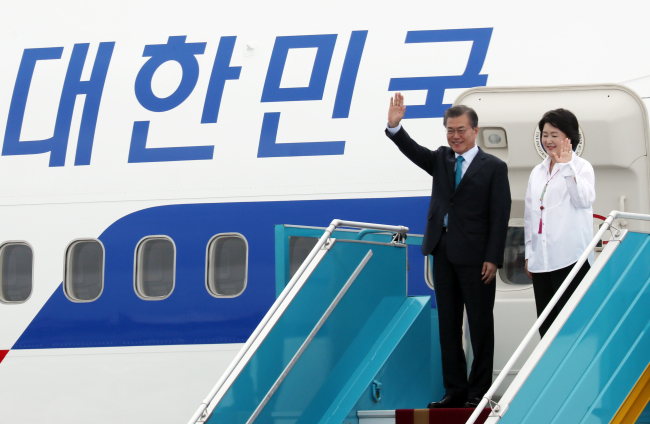South Korea has been roiled by a controversy over whether it should join a new foreign policy initiative of the US, apparently aimed at reining in the influence of China, as it seeks to strike a diplomatic balance between the two superpowers.
The “Indo-Pacific” initiative, which originated with Japanese Prime Minister Shinzo Abe, envisions the US working with Japan and other maritime democracies -- Australia and India -- to contain a rising China.
South Korea was dragged into the matter when US President Donald Trump said in a joint statement by him and President Moon Jae-in after a summit talk that the Korea-US alliance remains “a linchpin for security, stability, and prosperity in the Indo-Pacific.” There was no mention of Moon supporting the idea in the statement.
 |
(Yonhap) |
On Thursday, one of Moon’s aides said there was “no need” for South Korea to join the initiative.
“Japan is trying to establish a so-called ‘Indo-Pacific line” linking Japan, Australia, India and the US. I don’t think we should join the efforts,” said Kim Hyun-chul, a presidential economic adviser, who accompanied Moon’s visit to Indonesia.
Hours later, Seoul changed its tone and highlighted that there was “common ground” between the US’ new initiative and Seoul’s foreign policy, apparently worried about ties with the US.
When asked why only Trump’s words were included in the statement, another presidential senior official said Trump had asked Moon to join the Indo-Pacific initiative, but the proposal was a surprise one that the government “has yet to give serious consideration.”
“(The statement) shows President Trump highlighted (the Indo-Pacific issue). That doesn’t mean we agreed to it,” said the official to reporters under the customary condition of anonymity. “For President Moon, it was basically a fresh concept, so we decided to drop (our part) out of the agreement.
The issue is likely to pose a diplomatic challenge to the Moon administration, which seeks to find a balance between the decades-old military alliance with the US and its growing economic partnership with China.
Experts said Seoul’s flip-flop over the issue represents a dilemma in finding an ideal balance between the US and China, a diplomatic conundrum intensified by regional rivalry between the two countries.
Introduced by Prime Minister Abe during his speech in Kenya, the strategy calls for “free and open” economic and security cooperation stretching from the US to Japan, down through Southeast Asia to Australia, and west across another ocean to India.
But the idea is designed to expand the US’ strategic interest beyond the previous Asia-Pacific region to include India, the world’s most populous democracy, analysts said, as a counterweight to China, which asserts its role over the region through maritime disputes.
Before kicking off the five-nation trip to Asia, Trump’s cabinet members and advisers used the terms to describe their diplomatic mission. It appeared in Trump’s comments and statements in Tokyo, Seoul and Beijing.
“It’s difficult for South Korea to pull itself out of the initiative, because it is something to do with a rule-based approach, freedom of navigation and economic opportunity,” said Shin Bum-cheol, a professor at Korea National Diplomatic Academy.
“South Korea could consider joining the initiative for the moment, and change its degree of participation accordingly depending on how China reacts.”
In a legislative meeting at the National Assembly on Friday, Deputy Foreign Minister Cho Hyun said presidential adviser Kim’s remark was a “personal view” and the government would seek to have common ground with the US.
“From the government’s perspective, (the Indo-Pacific initiative) is worthy of discussion and study,” Cho told lawmakers.
“Indo-Pacific is not an established concept, it is an evolving one. … We have close coordination with the US and agreed to seek common ground.”
By Yeo Jun-suk (
jasonyeo@heraldcorp.com)






![[Exclusive] Hyundai Mobis eyes closer ties with BYD](http://res.heraldm.com/phpwas/restmb_idxmake.php?idx=644&simg=/content/image/2024/11/25/20241125050044_0.jpg)
![[Herald Review] 'Gangnam B-Side' combines social realism with masterful suspense, performance](http://res.heraldm.com/phpwas/restmb_idxmake.php?idx=644&simg=/content/image/2024/11/25/20241125050072_0.jpg)
